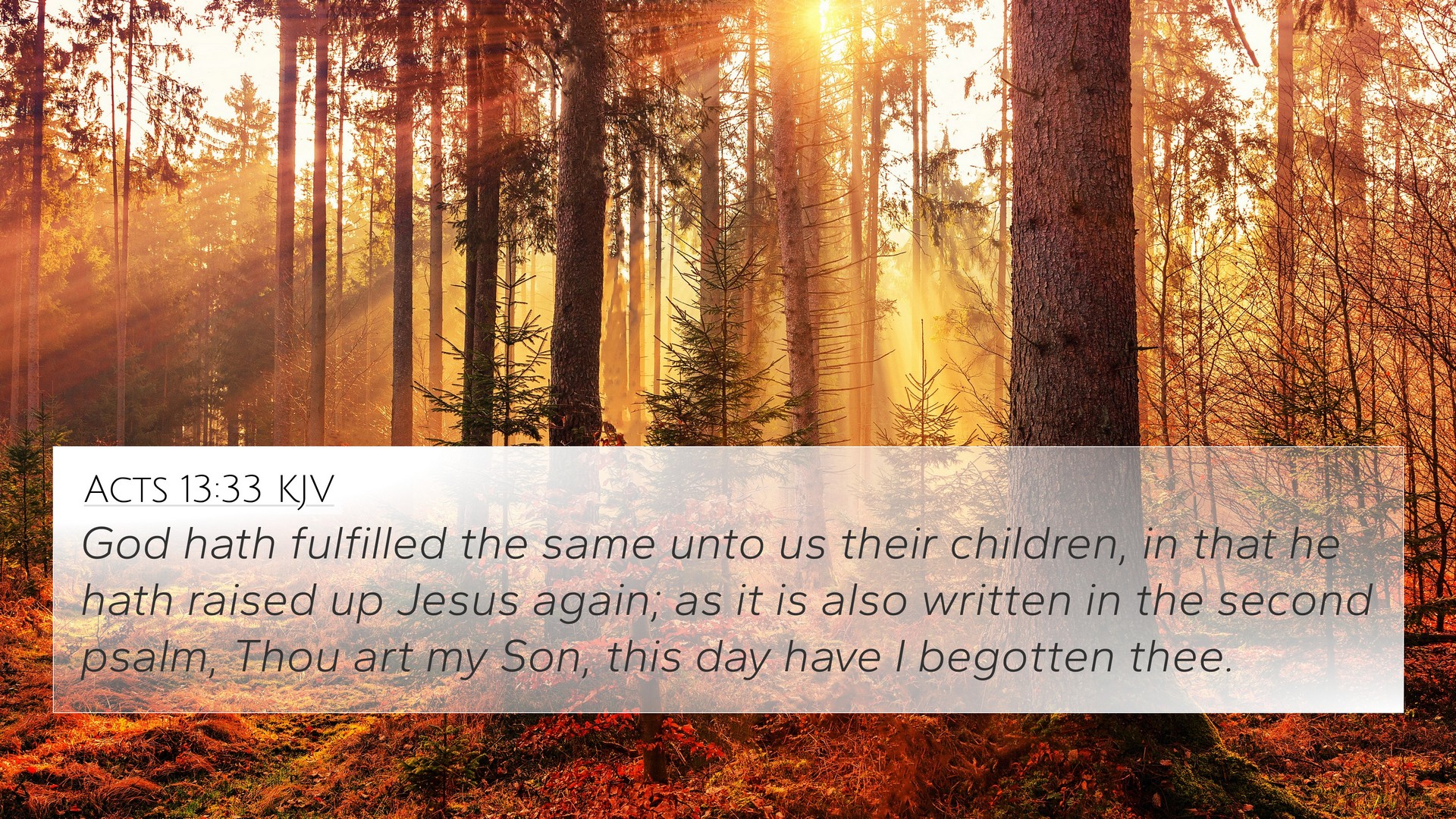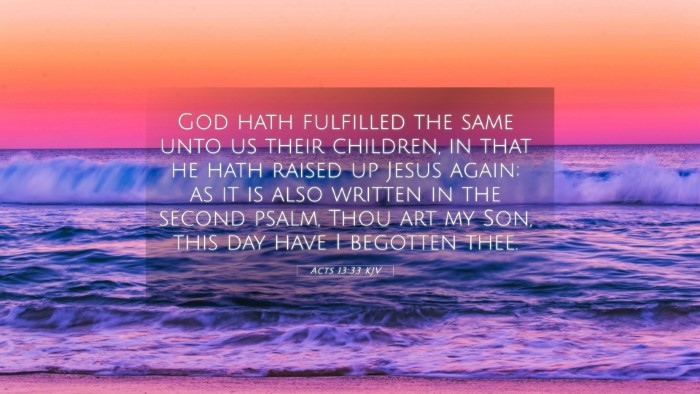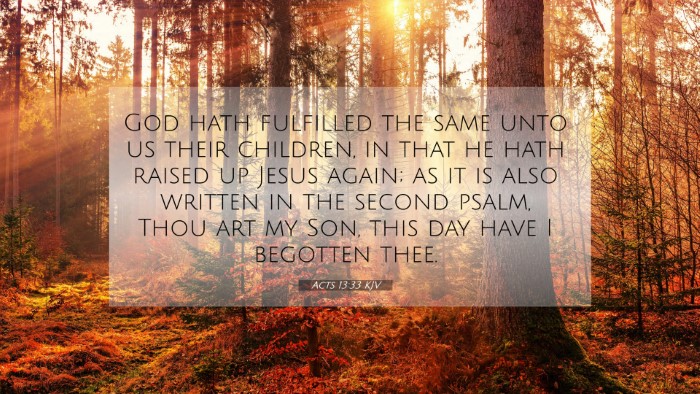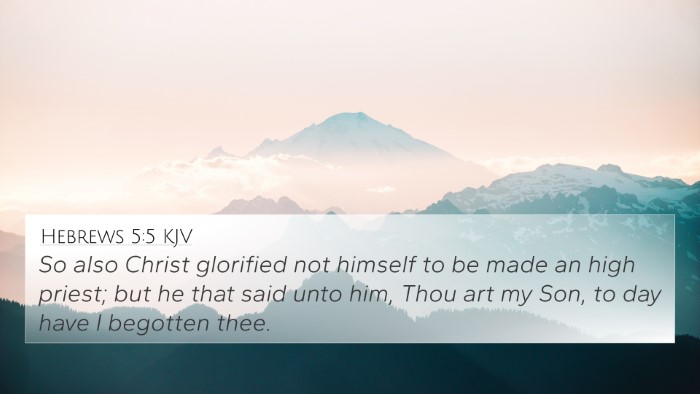Understanding Acts 13:33
Acts 13:33 states, "God has fulfilled this for us, their children, in that He has raised up Jesus, as it is written in the second Psalm: 'You are My Son, Today I have begotten You.'" This verse emphasizes the resurrection of Jesus Christ and its fulfillment of the prophecy found in the Psalms.
Commentary Insights
Matthew Henry notes that this verse signifies the Lord’s declaration of Jesus as His Son upon His resurrection. This illustrates how the resurrection confirms Jesus' divine sonship and His role in God's redemptive plan.
Albert Barnes emphasizes that the phrase "You are My Son" highlights the unique relationship between God the Father and Jesus, asserting Jesus' status as the Messiah. The phrase from the Psalms points to the affirmation of Jesus' authority and His eternal sonship.
Adam Clarke further elaborates on how this declaration not only refers to the resurrection but also signifies the new covenant established through Jesus. He connects the begetting mentioned in the Psalm to the new life bestowed upon believers through faith in Christ.
Bible Cross-References
Acts 13:33 is linked to several key scriptures which provide further understanding and context. Below are some relevant cross-references:
- Psalm 2:7: "I will declare the decree: The Lord has said to Me, 'You are My Son, Today I have begotten You.'" - This verse is the original quotation referred to in Acts 13:33.
- Romans 1:4: "And declared to be the Son of God with power according to the Spirit of holiness, by the resurrection from the dead." - This supports the theme of Jesus' sonship being confirmed by His resurrection.
- John 1:14: "And the Word became flesh and dwelt among us, and we beheld His glory, the glory as of the only begotten of the Father." - This illustrates the incarnation of the Son of God.
- Hebrews 1:5: "For to which of the angels did He ever say, 'You are My Son, Today I have begotten You'?" - This reinforces the unique relationship between Jesus and God the Father.
- Matthew 3:17: "And suddenly a voice came from heaven, saying, 'This is My beloved Son, in whom I am well pleased.'" - This moment of affirmation at Jesus' baptism connects to His identity and mission.
- Acts 4:27-30: These verses reflect the early church's understanding of prophecy fulfillment in relation to Jesus as the Messiah.
- 1 Corinthians 15:20: "But now Christ is risen from the dead, and has become the firstfruits of those who have fallen asleep." - This emphasizes Jesus' resurrection in the context of Christian hope.
Thematic Connections
This verse ties to various biblical themes, especially those centering on the identity and mission of Jesus Christ. The resurrection not only affirms His sonship but also has profound implications for believers, signifying hope and new life.
Connecting Verses for Deeper Study
- Isaiah 9:6: Foretells the coming of a child who is called "Mighty God" and "Everlasting Father," contributing to the understanding of Jesus’ nature.
- Philippians 2:9-11: Declares that God has exalted Jesus and given Him a name above every name, further establishing His authority as the risen Son of God.
- Revelation 1:5: Refers to Jesus as "the faithful witness, the firstborn from the dead," tying back to the themes found in Acts 13:33.
Applications for Study
For effective Bible study, especially when exploring themes around Acts 13:33, consider using the following methods:
- Utilize a Bible concordance to discover additional cross-references related to the themes of sonship and resurrection.
- Engage in cross-reference Bible study by tracing themes and teachings between Acts and the Psalms.
- Examine Bible chain references to understand how this verse links to both Old and New Testament texts.
- Analyze the Comparative study of Pauline epistles to explore how Paul interprets Jesus' resurrection in his letters.
Conclusion
Acts 13:33 serves as a pivotal declaration of Jesus' resurrection and affirmation of His identity as the Son of God. By exploring its connections with related scripture, one can develop a more comprehensive understanding of how this verse fits into the larger narrative of the Bible. Using tools for cross-referencing and thematic analysis aids in unlocking the richness of scripture, fostering a deeper spiritual insight and appreciation for the connections between biblical texts.





